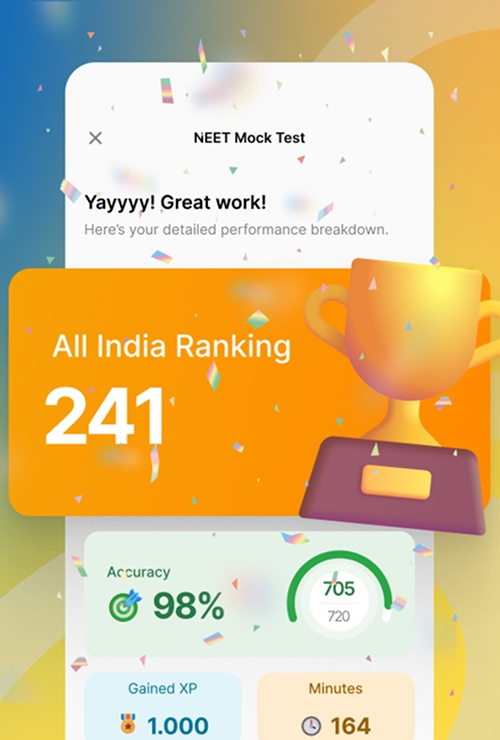
☝️ At a glance
NEET rank predictors are helpful but not 100% accurate, as they rely on historical data and can’t account for yearly changes in exam difficulty and competition.
Predicted ranks may differ from actual ranks due to varying factors like student performance, seat matrix changes, and category-based cutoffs.
These tools offer a reliable estimate, helping NEET aspirants strategize college choices and understand their possible standing based on expected scores.
Use rank predictors as guidance tools, not final outcomes, and combine them with updated counseling information for better admission planning.
If you're a NEET 2025 aspirant, you're probably anxious about your expected rank based on your NEET score as NEET UG result announcement is in the corner. Meanwhile when National Testing Agency (NTA) is taking time to release official results, many students rely on NEET rank predictor tools to get an early rank estimation.
But how accurate are these predictors? How do they work? And what factors influence your predicted rank? In this article, we’ll explore everything you need to know about NEET 2025 rank predictor tools, their reliability, and how they can help you shortlist colleges.
What is a NEET rank predictor?
A NEET Rank Predictor is a smart online free tool designed to estimate your probable All India Rank (AIR) in the National Eligibility cum Entrance Test (NEET) based on your expected or same marks. As one of the most competitive entrance exams in India for medical aspirants, NEET receives over 20 lakh registrations annually. Predicting your rank ahead of official results can help plan the next steps in your medical career—especially for choosing colleges during counseling rounds.
When did NEET rank predictors start gaining popularity?
Rank prediction tools started gaining popularity after NEET replaced the AIPMT (All India Pre-Medical Test) in 2016, when a single centralized entrance test was introduced for MBBS and BDS admissions across India. With this consolidation, the competition became stiffer, and aspirants needed early insights to reduce anxiety and improve college planning. Edtech platforms began launching NEET rank predictors as early as 2017–2018, using previous data and analytics.
What do NEET rank predictors analyze?
To offer an approximate rank estimate, these tools analyze several crucial factors:
1. Previous year cutoff trends
Cutoff trends from past NEET exams help establish score-to-rank patterns. For example, if a score of 650 corresponded to an AIR of 2,000 last year, and this year's difficulty level is similar, your expected rank will fall in that range.
Why it matters: Cutoffs vary year-to-year, and historical trends provide a baseline for prediction.
2. Exam difficulty level
The relative difficulty of NEET 2025 compared to previous years plays a key role. If this year’s paper is tougher, scores across the board may be lower, and a given score could correspond to a better rank than usual.
When difficulty scaling began: Since NEET became the sole medical entrance exam, normalizing ranks based on difficulty became essential for fair evaluations.
3. Number of test-takers
The total number of NEET candidates appearing in a given year directly affects percentile and rank distribution. A higher number of candidates usually tightens competition and can shift rank estimates slightly.
Example: In NEET 2024, over 23 lakh students appeared, up from 20 lakh in 2023. That influenced percentile-based cutoff predictions.
4. Category-wise qualifying marks
Different categories (General, OBC, SC, ST, EWS) have varying qualifying percentiles and ranks. The predictor adjusts its calculation based on your reservation category, which impacts your chances of getting into government colleges or AIQ (All India Quota) seats.
Key note: NEET qualifying percentiles are usually 50th percentile for General, 40th for reserved categories.
Click here to download the NEET Zoology chapter-wise weightage
Download PDFHow does a NEET rank predictor help?
By comparing your NEET marks against this multi-dimensional data, the predictor provides a ballpark rank. This can be critical for:
Understanding college admission possibilities
Identifying rounds of counseling to participate in
Deciding between state quota and AIQ
Reducing stress by setting realistic expectations early
How does a NEET rank predictor work?
NEET Rank Predictor relies on blend of data analytics, past trends, and exam insights. While they don’t provide official ranks, their estimates are often fairly close, especially when powered by accurate and updated data.
Here’s how they typically function:
1. Statistical models
Rank predictors use statistical algorithms based on historical data, score-to-rank mapping. These models process large data sets from previous years to identify patterns and forecast the rank distribution curve.
Example: If 615 marks fetched AIR 6,200 in 2023 and the 2025 paper is similar in level, the tool will align your rank accordingly.
2. Data analysis
Advanced predictors analyze data from millions of test-takers. This includes score distribution, top percentiles, and category NEET qualifying marks. The more data a predictor has access to, the more reliable is estimated rank.
Improved accuracy: In recent years, with platforms like NTA and coaching institutes releasing detailed statistics, rank predictors have become more refined.
3. Exam-specific inputs
Some predictors adjust for NEET 2025 exam-specific parameters, such as paper difficulty (based on student feedback or coaching expert reviews), changes in question pattern, or marking scheme (if altered).
Dynamic scoring models allow the predictor to remain current with NEET 2025 standards.
4. Percentile calculation
Most predictors also calculate your NEET percentile, which reflects your performance relative to all test-takers.
Formula used:
Percentile Score = (Number of candidates who scored less than you / Total candidates) × 100
This percentile is then used to reverse-engineer your likely rank, taking into account total students and category distribution.
Click here to download the NEET Botany chapter-wise weightage
Download PDFKey factors affecting your NEET 2025 Rank
Securing a good NEET 2025 rank isn't just about your raw score—it’s influenced by several external factors. Understanding these can help you set realistic goals, analyze your performance smartly, and prepare for counseling sessions confidently. Here's a deeper look into each one:
1. NEET score vs minimum qualifying marks
Your NEET score is the most direct factor affecting your rank. However, scoring above the minimum qualifying marks is the first barrier every candidate must cross.
Different cutoffs for different categories:
The qualifying percentile varies by category:General/Unreserved (UR): Typically around the 50th percentile.
SC/ST/OBC: Usually around the 40th percentile.
PWD candidates have separate criteria as well.
These percentile-based thresholds are converted to marks based on the exam’s difficulty each year. For instance, in an easier NEET paper, the 50th percentile might translate into a higher score than in a tougher paper.
Why it matters:
Merely qualifying doesn't guarantee admission. For government colleges or top private institutions, your score must be significantly higher than the qualifying cutoff to secure a competitive All India Rank (AIR).General category challenge:
Since General category candidates face higher cutoffs and lesser reservation benefits, they usually need to aim for 600+ marks (or more) for government MBBS seats.
2. Exam difficulty Level
The perceived toughness of NEET 2025 can heavily influence your final rank.
Harder paper = lower cutoffs:
If the paper is considered difficult by most candidates, average scores across the country drop. In such cases, even a modest score may fetch you a better rank than usual.Easier paper = higher cutoffs:
If the paper is on the easier side, more students score high, raising the overall competition and cutoffs. This could push your rank down, even with a decent score.Impact on percentile vs. raw marks:
Remember, your percentile is a comparative indicator. So your performance relative to others is more important than the raw score alone.
3. Number of test-takers
The total number of students appearing for NEET each year has a significant impact on your rank.
More aspirants = more competition:
With over 20 lakh candidates expected to register for NEET 2025, the competition is intense. Even a small drop in accuracy can lead to a huge shift in ranks.Larger pool = tougher rank prediction:
It becomes harder to predict ranks accurately when lakhs of students fall within similar score brackets. For example, a difference of just 1–2 marks could change your rank by hundreds or even thousands.State-wise impact:
Popular states with more candidates (like Maharashtra, Uttar Pradesh, Tamil Nadu, etc.) see denser competition in their state quota counseling rounds too.
4. Previous year cutoff trends
Looking at past year NEET cutoff data is one of the smartest ways to estimate your chances.
Different colleges, different cutoffs:
Government MBBS seats are highly competitive. In 2024, top government medical colleges saw cutoffs crossing 680+ marks in the general category under the All India Quota (AIQ). On the other hand, dental colleges and private institutions tend to have comparatively lower cutoffs.State quota vs. all India quota (AIQ):
AIQ (15%): Reserved for top scorers from all over the country, so the cutoffs are higher.
State quota (85%): Seats are filled by candidates from the same state, so cutoffs can vary significantly based on state-level competition, reservation policies, and college reputation.
Trends over time:
NEET cutoffs have been increasing every year, especially for government colleges. Knowing the minimum NEET score required for enrollment in government medical colleges is important.
How to use a NEET rank predictor tool effectively?
A NEET rank predictor helps you estimate your rank before the official results are out. Here’s how to use it smartly:
Step 1: Estimate your NEET score
Use NEET answer keys from reliable sources to check your answers.
Apply the official marking scheme: +4 for correct, -1 for incorrect answers.
Calculate your total expected score honestly for better accuracy.
Step 2: Use a trusted predictor tool
Visit reliable platforms.
Enter your expected score, category, and state of domicile.
Submit the form to get your predicted NEET rank.
Step 3: Compare with past year trends
Review previous years’ predicted vs. actual ranks.
Use 2–3 different tools to cross-check for consistency.
Understand that a slight variation is normal.
Step 4: Shortlist colleges based on rank
Match your predicted rank with past cutoffs of medical colleges.
Use both state-wise and All India Quota (AIQ) predictors.
Create a college list with safe, target, and dream options.
Are NEET rank predictors 100% accurate?
No, NEET rank predictors are not 100% accurate. While helpful, they are only estimates and not official results. Here’s why:
Based on past trends
These tools use previous years' data to predict ranks. But NEET trends change yearly, so past patterns may not always hold true.
Varying exam difficulty
The difficulty of NEET changes every year. A score that gave you a top rank one year may result in a different rank the next year.
Changing counseling factors
Seat availability, reservation rules, and state quotas change annually. These dynamic elements can affect your admission chances—something predictors can't fully factor in.
What they’re good for
Though not exact, rank predictors give a safe probable rank range, helping you:
Understand where you stand,
Secure admission while Exploring possible colleges,
Plan better for counseling.
What after NEET rank prediction?
Once you have an estimated NEET rank, focus on:
1. College shortlisting
Check medical & dental colleges accepting your rank.
Compare government vs. private colleges.
2. Counseling preparation
Register for state & All-India counseling.
Keep documents ready (category certificates, ID proofs).
3. Backup options
If your rank is borderline, explore:
Private medical colleges
State quota seats
MBBS abroad
Conclusion
While the NEET rank predictor 2025 is not 100% accurate, it offers valuable guidance to NEET aspirants by providing an early estimate of their predicted rank based on expected NEET score and historical NEET data. These online tools, though not official, rely on past trend, and statistical models to help estimate both All India Rank and state rank.
Since NEET exam difficulty and minimum qualifying marks vary each year, the predicted and actual rank may differ. Still, using a NEET rank predictor tool gives a reliable estimate to shortlist medical colleges, dental colleges, or government medical colleges under state quota counseling or All India quota.
As you await your NEET exam results, use trusted rank predictor tools and NEET college predictors to explore colleges and secure your place in the next stage of your NEET journey.
NEETsheet offers expert-led online classes tailored for NEET aspirants, helping students strengthen their concepts, practice effectively, and stay ahead in the competition.
Click here to download the NEET Physics chapter-wise weightage
Download PDFFREQUENTLY ASKED QUESTIONS
FAQs about "NEET rank predictor"
Are really the output results of the free online NEET rank predictor guaranteed?
No, the results are not guaranteed. NEET rank predictors rely on previous data and trends, which may vary from year to year due to changes in exam difficulty, student performance, and seat available.
Can a NEET rank predictor help me choose medical colleges?
Yes, using a NEET college predictor along with your estimated NEET rank can help shortlist suitable colleges, especially under state quota and All India quota.
Why do predicted and actual NEET ranks differ?
Predicted ranks may vary from actual ranks due to changes in NEET exam difficulty, number of test-takers, and cutoff trends. These tools offer guidance, not guarantees.
Is it necessary to consider category-wise NEET qualifying marks in rank prediction?
Yes, your category NEET qualifying marks affect your rank estimation and college eligibility. Always input your correct category for a reliable estimate.
How accurate is the NEET 2025 rank predictor?
The NEET 2025 rank predictor provides an estimated rank, not an exact one. Accuracy depends on factors like your entered score, category, and comparison with historical NEET data.






